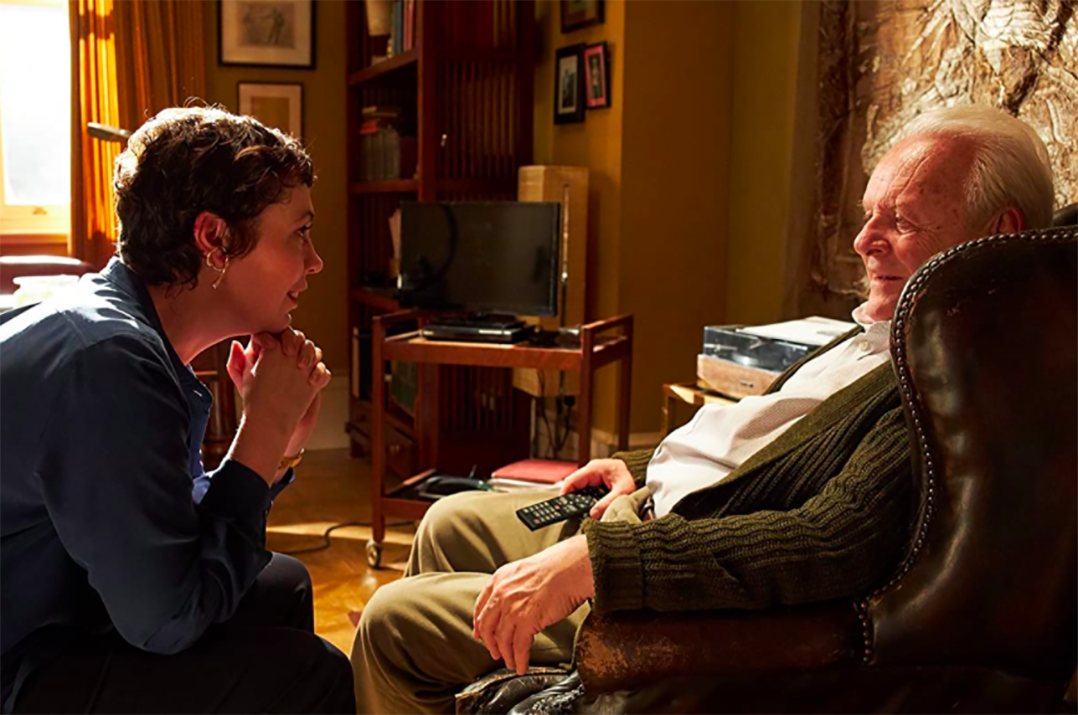Hollywood has given us a flurry of recent motion pictures dealing with Alzheimer’s Disease and dementia. Julianne Moore won an Oscar for her portrayal of a middle-aged woman experiencing early-onset Alzheimer’s in Richard Glatzer’s 2014 drama “Still Alice.” This year has brought us “Supernova,” in which Stanley Tucci’s oncoming dementia is in its early stages. And in the sci-fi drama “Little Fish,” Olivia Cooke plays a young wife dealing with her husband’s evolving dementia at the hands of a worldwide pandemic.
In each of these cases, we witness the mental decay through the eyes of a spouse or caregiver. That’s the “logical” way to follow such a story. Remember in “Rain Man,” the Tom Cruise character was our guide to uncovering the depths of autism displayed by Dustin Hoffman’s character. Again, that seems the logical method of handling such a narrative.
Now, throw that structure out the window for “The Father,” an adaptation of French playwright Florian Zeller’s “Le Pere,” which was co-written and directed by Zeller. In “The Father,” we observe the mental loss directly from the protagonist. Anthony Hopkins plays Antony, a long-retired and widowed engineer living in a London flat with his daughter Anne, played by Olivia Colman. At the outset of “The Father,” Anne announces to Antony that she will soon be moving to Paris to live with her new significant other. In the following scene, Antony is surprised to encounter a stranger in his flat. He announces he is Anne’s husband. When Anne returns, she confirms the stranger’s account, and doesn’t know anything about moving to Paris.
We now realize “The Father” presents an entirely new way of viewing memory loss – through the mind of the victim, not the caretaker. This structure succeeds beyond our wildest imagination – so much so that we aren’t exactly certain if and when Antony moves in with his daughter, as their flats appear so similar. This similarity might be only in the manner Antony views the two flats, but he is our guide – and Zeller creates confusion for his audience, just as mental illness creates confusion for Antony.
When Antony looks out his bedroom window, he sees the city streets below. Yet other times, the flat appears to be located on the ground floor, in a more rural setting. This may have to do with the two flats – Antony’s and Anne’s. Or it might not. It may simply be the way Antony sees the outside at that particular moment. Structuring the screenplay in this fashion is certainly a compelling technique.
After scaring away a series of in-home caregivers tasked with taking care of Antony’s needs while Anne is away at work, Antony takes an immediate liking to a new candidate, Laura, when she arrives for a meet-and-greet session. She reminds Antony of his other daughter, Lucy. And he charms her with his dancing and storytelling. Sensing Laura may finally be the answer, she arrives the following morning (or is it a week later?) played by a completely different actress. Likewise, Anne’s husband is played by two different actors at various intervals. It’s also intentionally difficult to discern the passage of time in “The Father.”
Seeing dementia from the point of view of the affected is more than a mere gimmick. Zeller has taken a fairly common topic (mental deterioration) and completely turned it on its head in his provocative and engaging screenplay.
And it certainly doesn’t hurt that our tour guide through this film is perhaps our greatest living actor. Just when we think we’ve seen every card in the Anthony Hopkins playbook, he shows us something we haven’t seen before. At 83 years of age, I cannot say I’ve ever seen Hopkins play so vulnerable a character as he does in “The Father.” His final scene is Oscar material. I know he’s won previously (for 1991’s “Silence of the Lambs”), which historically makes him less likely to receive another, but judging every performance I’ve seen this year on it’s own merits, Hopkins is in a league of his own. With Hopkins anchoring “The Father,” the offbeat structure succeeds – where it may have proven confusing with a lesser talent in the lead role.
I also want to mention British actress Imogen Poots, who plays Laura, the new young caregiver. Her vitality injects a needed burst of energy about halfway through. She doesn’t have enough screen time to “steal the show,” but her character brings out a youthfulness in Antony that we hadn’t witnessed previously.
“The Father” ranks as one of the year’s best films. Coming out just before the Oscar nominations are announced, I believe “The Father” ranks alongside “Nomadland” and “One Night in Miami” as this year’s favorites.



